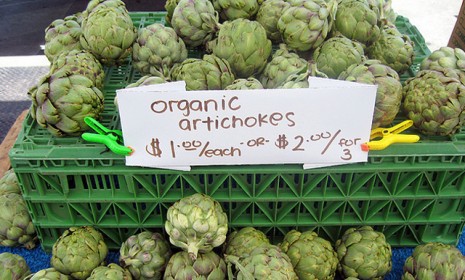Does eating organic food make you a jerk?
A new study finds that going organic can make you feel smug about yourself — and act nasty to others

A free daily email with the biggest news stories of the day – and the best features from TheWeek.com
You are now subscribed
Your newsletter sign-up was successful
Buying and eating organic food makes many people feel better about themselves. (Not coincidentally, organic products often have panderingly positive names, such as Honest Tea, Purity Life, and Smart Balance.) The flip side, according to a new study published in Social Psychological and Personality Science, is that organic eaters often look down on others, and aren't shy about expressing their derision. Does going organic turn you into a jerk? Here's what you should know:
How did researchers study the effects of organic food?
They divided 60 people into three groups: One was shown images of organics, such as spinach and apples; one was shown only comfort food, such as brownies; the third reviewed pictures of basics like rice and oatmeal. Then all three groups were asked to read vignettes about moral transgressions, such as cousins having sex or an ambulance-chasing lawyer hunting clients in an ER, and rank how bad the vignettes' protagonists were on a seven-point scale. The participants were also asked how much time they would be willing to volunteer for a fictitious study.
The Week
Escape your echo chamber. Get the facts behind the news, plus analysis from multiple perspectives.

Sign up for The Week's Free Newsletters
From our morning news briefing to a weekly Good News Newsletter, get the best of The Week delivered directly to your inbox.
From our morning news briefing to a weekly Good News Newsletter, get the best of The Week delivered directly to your inbox.
And what did they find?
The crowd exposed to organic foods judged others more harshly. On average, they put the offenses described in the vignettes at 5.5 on the seven-point scale. The people exposed to pictures of comfort food were the most mellow, with average ratings of 4.89. The organic group was also stingier with their volunteering time, offering to help out for 13 minutes, compared to 19 minutes for rice-and-oatmeal group, and 24 minutes for the comfort food crowd.
How do experts explain these results?
Author Kendall Eskine, a psychology professor at Loyola University in New Orleans, chalks it up to something he calls "moral licensing." People do something they see as a good deed, so they start feeling self-righteous. They also feel like "they have permission, or license, to act unethically later on," Eskine says. "It's like when you go to the gym and run a few miles and you feel good about yourself, so you eat a candy bar." How comforting, says Doug Berry at Jezebel. "Moral of the story: Eating cookies makes you a better person."
A free daily email with the biggest news stories of the day – and the best features from TheWeek.com
Sources: Jezebel, MSNBC, Seattle Post-Intelligencer, Social Psychological and Personality Science
-
 Tourangelle-style pork with prunes recipe
Tourangelle-style pork with prunes recipeThe Week Recommends This traditional, rustic dish is a French classic
-
 The Epstein files: glimpses of a deeply disturbing world
The Epstein files: glimpses of a deeply disturbing worldIn the Spotlight Trove of released documents paint a picture of depravity and privilege in which men hold the cards, and women are powerless or peripheral
-
 Jeff Bezos: cutting the legs off The Washington Post
Jeff Bezos: cutting the legs off The Washington PostIn the Spotlight A stalwart of American journalism is a shadow of itself after swingeing cuts by its billionaire owner